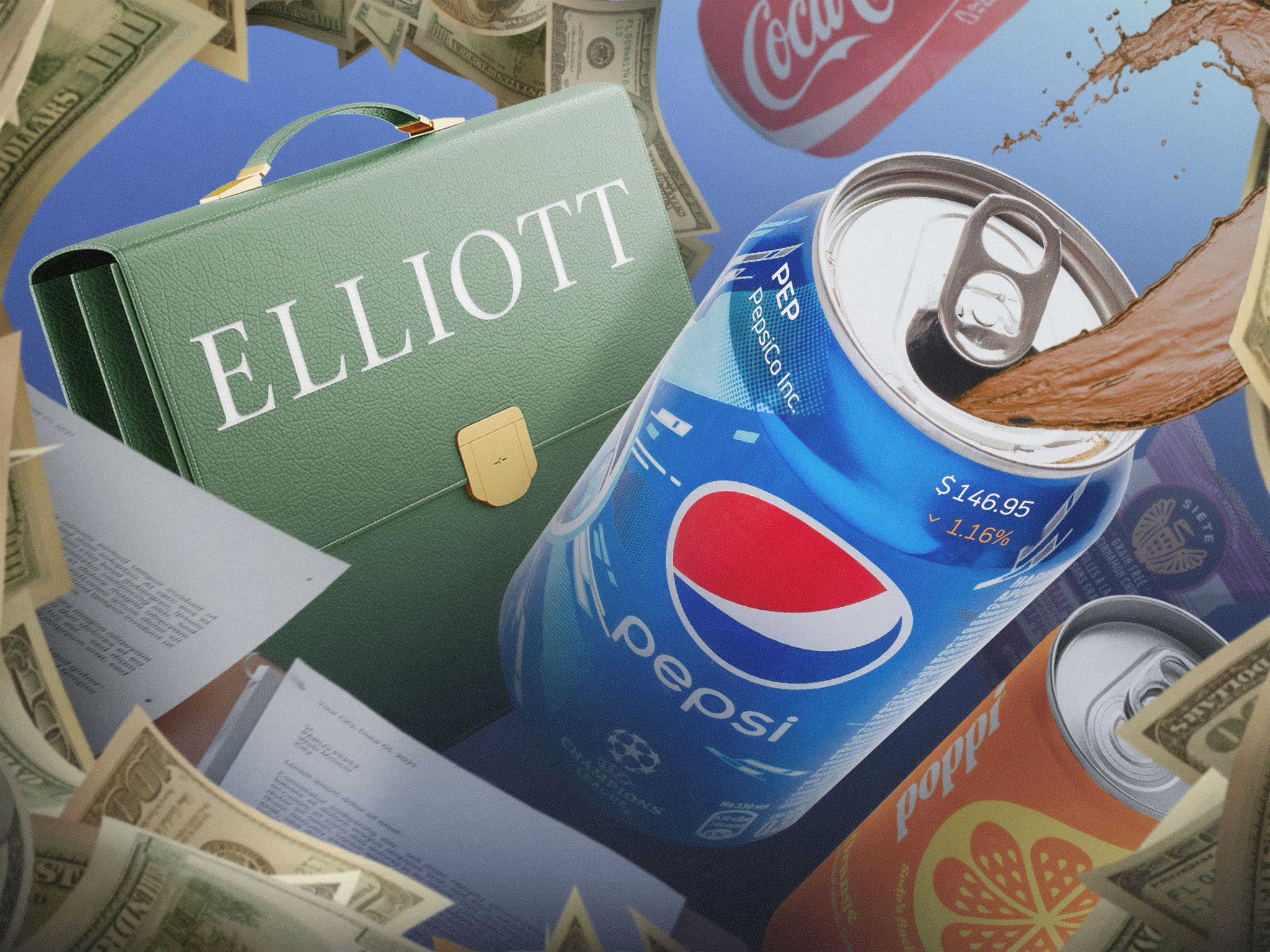The battle to be the number one U.S. snacks and drinks company is heating up with Elliott Investment Management’s recent $4 billion stake in PepsiCo (NASDAQ: PEP).
Activist investor Elliott believes its strategy can help turn around the struggling company and sell more soft drinks, chips and snacks while divesting some of the products that are not popular with consumers.
The stock has been lagging – in the past year it dropped by 15.3% compared to Coke (NASDAQ: COKE) which declined by 11.7%. PepsiCo’s five-year track record is not better – shares rose by only 8.3%.
Elliott is extremely confident and believes that if PepsiCo follows its playbook, the lagging stock could turn around by 50%.
The activist investor recommended the company refranchise the bottling business and sell or eliminate some of the products that do not generate a profit or ones that consumers find less appealing.
“While unfortunate, this disappointing trajectory has created a historic opportunity: With the right mindset and an appropriately ambitious turnaround plan, PepsiCo today represents a rare chance to revitalize a leading global enterprise and unlock significant shareholder value,” Elliott wrote in its letter, according to CNBC.
“Elliott’s goals at PepsiCo are straightforward: help the Company sharpen focus, drive innovation, become more efficient and unlock the value that its leading brands, unmatched scale and world class employees deserve. The path back to winning is clear and achievable.”
Sales have been slumping for the beverage and food manufacturer even though the company has closed plants and reduced its workforce. Last October, PepsiCo lowered its revenue estimate for 2024 as sales globally declined.
The company also laid off 400 employees in Atlanta, Cincinnati, Chicago and Harrisburg, Pennsylvania last October. The Chicago bottling plant was closed while the three remaining plants maintained its delivery, warehouse and sales functions last October. The company also closed a Quaker Oats factory in Danville, Illinois in 2024.
PepsiCo continued shuttering more plants this year. In July, PepsiCo closed its Detroit manufacturing, transport and maintenance operations while keeping the sales, field service, warehouse, fleet and delivery teams, the company said. Another manufacturing plant was shuttered for its North American food business during this quarter.
Frito-Lay, a subsidiary of PepsiCo, also closed its California and New York plants in 2025.
Cash-strapped consumers have also faced price hikes from manufacturers and cut back on their purchases. Other shoppers have shifted to healthier snacks with less salt and drinks that contain less sugar.
PepsiCo is attempting to win over those consumers and is working to diversify its product lineup. The company bought Poppi, a prebiotic soda company, for $1.95 billion in February, and also acquired Siete Foods, a Mexican-American tortilla chip company for $1.2 billion last October.
For several years, the company has sought to expand its portfolio and provide healthier options for consumers concerned about the ingredients they are consuming. In 2017, PepsiCo launched a premium bottled water called Lifewtr. Another drink called Lemon Lemon
Sparkling Lemonade was also launched that year, but was discontinued in 2019.
PepsiCo, which manufactures its namesake soda, plus Gatorade Mountain Dew, Dorito’s, Lay’s, and Quaker Oats, did not comment on any of Elliott’s proposals.
“PepsiCo maintains an active and productive dialogue with our shareholders and values constructive input on delivering long-term shareholder value,” Pepsi said in a statement. “We note Elliott Investment Management’s disclosure of its presentation and will review its perspectives within the context of our strategy to drive sustainable growth.”
Revenue and earnings per share both rose during PepsiCo’s second quarter as demand fell. The company reported net sales increased by 1% to $22.73 billion on 1.26 billion net income, earning $2.12 per share. Global volume dropped by 1.5% for food products while volume for drinks remained flat.
Consumers have cut back on spending as inflation and higher interest rates for credit cards, mortgages and other debt have eroded their earnings.
PepsiCo’s North America food business reached a peak in late 2022, but has experienced a slow down every quarter since that time period, Wells Fargo analyst Chris Carey wrote in a June research note. He also said the company should conduct a “major rethink” of the unit’s cost structure since it could result in nearly $800 million in savings.
The beverage business consisted of 40% of PepsiCo’s revenue in 2024 and should be spun off into its own company, industry experts told the Wall Street Journal.
Elliott’s Track Record
Elliott has been an activist investor for nearly five decades and has been successful in pushing for management teams to follow their recommendations.
After acquiring an undisclosed stake in Starbucks in 2024, Elliott stressed the importance of appointing a new CEO which resulted in the hiring of Brian Niccol. Starbucks also faced weakening sales as consumers have changed their drink preferences.
Starbucks reported net sales increasing by 4% to $9.5 billion on $558.3 fiscal third-quarter net income, down from $1.05 billion a year earlier. Global same-store sales declined 2%.
Privately-held Elliott has $70 billion in assets under management and its pressure on companies can produce generous returns for investors. The investor also owns stakes in Southwest Airlines and Phillips 66 and is seeking changes at both companies. Whether PepsiCo’s cost-cutting measures of plant closures and workforce reductions and new drink and snack choices will encourage consumers to spend more money at grocers and large retailers remains murky as inflation remains high. But Elliott’s strong influence could result in more savings for PepsiCo and a win for shareholders.




Comments